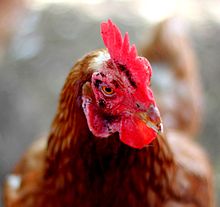Poultry diseases occur in poultry, which are domesticated birds kept for their meat, eggs or feathers.[1] Poultry species include the chicken, turkey, duck, goose and ostrich.[1]
Viral diseases[edit]

- Avian infectious bronchitis, caused by a strain of Avian coronavirus previously known as infectious bronchitis virus[2]
- Avian infectious laryngotracheitis, caused by Gallid alphaherpesvirus 1[3]
- Avian influenza, caused by Avian influenza virus[4]
- Duck plague, caused by Anatid alphaherpesvirus 1
- Chicken infectious anemia, caused by Chicken anaemia virus[5]
- Epidemic tremor, caused by Tremovirus[6]
- Fowlpox, caused by viruses in the genus Avipoxvirus
- Infectious bursal disease (IBD), also known Gumboro disease, caused by Infectious bursal disease virus
- Lymphoid leukosis caused by avian sarcoma leukosis virus
- Marek's disease
- Newcastle disease
- Viral arthritis, caused by Avian reovirus[7]
Parasitic diseases[edit]

- Scaly leg, caused by the mite Knemidocoptes mutans[8]
- Infestation by Dermanyssus gallinae, the red poultry mite[9]
- Infestation by Echidnophaga gallinacea, the sticktight flea[10]
Bacterial diseases[edit]
- Colibacillosis in poultry
- Infectious coryza in chickens
- Ornithobacterium rhinotracheale
- Pullorum disease
- Riemerella anatipestifer
- Salmonellosis in poultry
- Staphylococcal infection in poultry
- Streptococcal infection in poultry
- Omphalitis in chicks (mushy chick disease)
- Mycoplasmosis
- Fowl cholera
- Campylobacteriosis
- Pseudomonas
- Ornithobacteriosis
Protozoal diseases[edit]
- Histomoniasis (blackhead disease), caused by Histomonas meleagridis
- Coccidiosis
- Trichomonas gallinae
Fungal diseases[edit]
- Ergotism, which occurs when poultry feed is contaminated with toxic alkaloids produced by fungi of the genus Claviceps[11]
- Aspergillosis, a non-contagious disease caused when birds inhale Aspergillus spores that cause breathing to be hard for the bird[12]
- Ringworm
References[edit]
- ^ a b "Poultry species". Food and Agriculture Organization of the United Nations. Retrieved 21 August 2021.
- ^ de Wit, J.J. Sjaak; Cook, Jane K.A. (August 2020). "Spotlight on avian coronaviruses". Avian Pathology. 49 (4): 313–316. doi:10.1080/03079457.2020.1761010. PMID 32374218.
- ^ García, Maricarmen; Zavala, Guillermo (28 January 2019). "Commercial vaccines and vaccination strategies against infectious laryngotracheitis: what we have learned and knowledge gaps that remain". Avian Diseases. 63 (2): 325–334. doi:10.1637/11967-090218-Review.1. PMID 31251534. S2CID 195413194.
- ^ Barjesteh, Neda; O'Dowd, Kelsey; Vahedi, Seyed Milad (March 2020). "Antiviral responses against chicken respiratory infections: Focus on avian influenza virus and infectious bronchitis virus". Cytokine. 127: 154961. doi:10.1016/j.cyto.2019.154961. PMC 7129915. PMID 31901597.
- ^ Fatoba, A. J.; Adeleke, M. A. (2019). "Chicken anemia virus: A deadly pathogen of poultry". Acta Virologica. 63 (1): 19–25. doi:10.4149/av_2019_110. PMID 30879309.
- ^ Wernery, Ulrich (2016). "Viral diseases". In Samour, Jaime (ed.). Avian medicine (3rd ed.). Elsevier. p. 435. ISBN 9780723439554.
- ^ Nicholds, Jenny; Sellers, Holly S. (March 2020). "Viral arthritis in poultry". Merck Veterinary Manual. Retrieved 21 August 2021.
- ^ Sparagano, Olivier A. E.; Ho, Jeffery (9 July 2020). "Parasitic mite fauna in Asian poultry farming systems". Frontiers in Veterinary Science. 7: 400. doi:10.3389/fvets.2020.00400. PMC 7363926. PMID 32733926.
- ^ George, David R; Finn, Robert D; Graham, Kirsty M; Mul, Monique F; Maurer, Veronika; Moro, Claire Valiente; Sparagano, Olivier AE (December 2015). "Should the poultry red mite Dermanyssus gallinae be of wider concern for veterinary and medical science?". Parasites & Vectors. 8 (1): 178. doi:10.1186/s13071-015-0768-7. PMC 4377040. PMID 25884317.
- ^ Koehler, Philip G.; Pereira, Roberto M.; Kaufman, Phillip E. (13 November 2018). "ENY-244/MG236: Sticktight Flea, Echidnophaga gallinacea". University of Florida, Institute of Food and Agricultural Sciences. Retrieved 22 August 2021.
- ^ Coufal-Majewski, Stephanie; Stanford, Kim; McAllister, Tim; Blakley, Barry; McKinnon, John; Chaves, Alexandre Vieira; Wang, Yuxi (25 February 2016). "Impacts of cereal ergot in food animal production". Frontiers in Veterinary Science. 3: 15. doi:10.3389/fvets.2016.00015. PMC 4766294. PMID 26942186.
- ^ Beernaert, L. A.; Pasmans, F.; Van Waeyenberghe, L.; Haesebrouck, F.; Martel, A. (October 2010). "Aspergillus infections in birds: a review". Avian Pathology. 39 (5): 325–331. doi:10.1080/03079457.2010.506210. PMID 20954008.
Well, that’s interesting to know that Psilotum nudum are known as whisk ferns. Psilotum nudum is the commoner species of the two. While the P. flaccidum is a rare species and is found in the tropical islands. Both the species are usually epiphytic in habit and grow upon tree ferns. These species may also be terrestrial and grow in humus or in the crevices of the rocks.
View the detailed Guide of Psilotum nudum: Detailed Study Of Psilotum Nudum (Whisk Fern), Classification, Anatomy, Reproduction